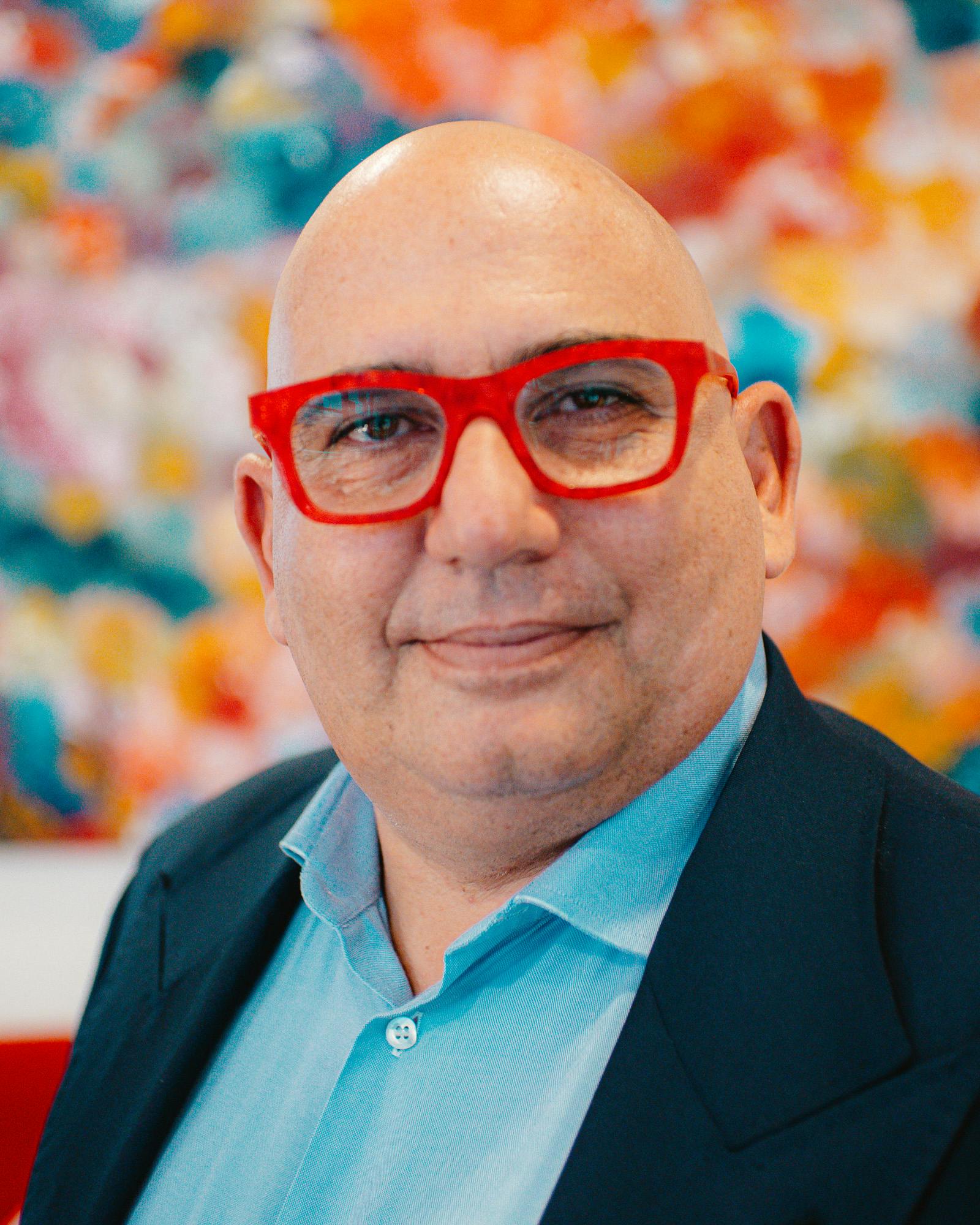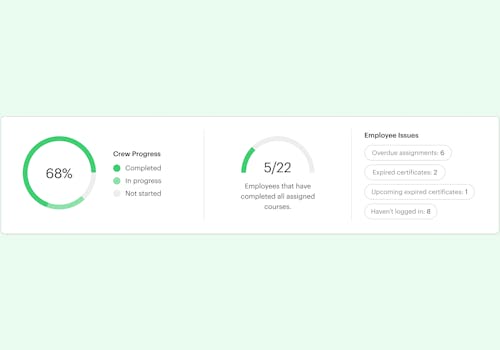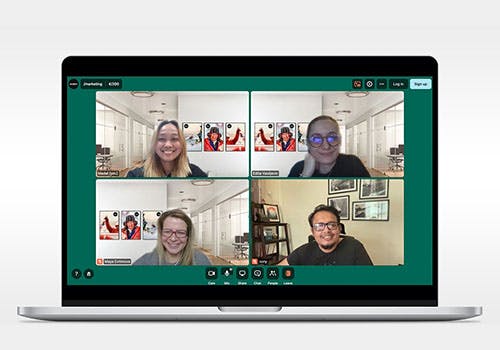Seably, the world's leading marketplace for maritime training that offers highly innovative education courses for the shipping industry, is now working a four-day week. The trial is part of the most extensive pilot programme conducted by 4 Day Week Global, which now includes 150 companies worldwide.
The digital transformational company Seably prides itself on being an innovative company in its product development. However, they want to show that this is also a part of their culture. This is why they have been exploring ways to work smarter, more productively and engagingly and have concluded that a four-day week culture is the right way forward for them. The first phase began on 1 September and runs to 30 November 2022. Seably is already seeing the benefits. Most employees are not working Fridays, except for the customer support teams, who changed their work pattern to increase the level of support to 24/7. During this trial period, Seably is closely monitoring how well it works for all its stakeholders and making any adjustments as needed.

4 Day Week Global is a not-for-profit community established by Andrew Barnes and Charlotte Lockhart to provide a platform for like-minded people who are interested in supporting the idea of the 4 day week as a part of the future of work.
The four-day week model is based on the 100:80:100™ principle - 100 per cent of the pay for 80 per cent of the time in exchange for maintaining 100 per cent productivity. So it's not just having a day off a week - it's about delivering productivity, meeting customer service standards and meeting personal and team business goals and objectives.
The evidence from recent experiences shows that giving employees a day off without loss of pay is a good deal for both businesses and employees. Employees report much higher satisfaction and less burnout. Shorter hours are often associated with higher per-hour productivity. Work reorganisation, especially when workers can make changes, allows organisations to eliminate long meetings and make each hour in the workplace count. In addition to making up the productivity, companies can save on fewer sick days, better retention and an enhanced labour pool talent.
CEO of Seably, Andrea Lodolo, stated: "We firmly believe that as a digitally native company without physical assets, we must challenge the norm and lead in innovative ways to manage performance and service. It is widely acknowledged that diversity in thinking helps seed new ideas for success and break down barriers. This is why we have introduced the four-day week to Seably. Staying ahead requires daring innovation, courage and a personalised and contextualised approach."
He continues, "When Henry Ford introduced the 40-hour, five-day working week across his North American automotive factories in 1926, giving employees an extra day off without a reduction in pay, other industry chiefs baulked. However, the visionary leader saw what was dismissed by others as radical as a way to increase productivity and create greater prosperity. Seably is proud to follow in his footsteps and, just like Ford, will enhance our service delivery to our customers, clients and stakeholders in the same way or even greater than before."
With professors and researchers from Boston College in the USA and Cambridge University in the UK, the companies in the trial will contribute to the research being undertaken to evaluate the four-day week's economic, social and environmental impacts.
Describing how the future of working will look at Seably, Andrea Lodolo explained: "We believe in the four-day week, where every staff member is scheduled to work Monday to Thursday. Friday is seen as part of the weekend unless it is critical for operational business reasons. For everything to run smoothly, there are guidelines to help everyone work as efficiently and practically as possible."
Various studies and trials across the world, from Iceland to Japan, prove that people who work a four-day week are more focused and efficient at work and feel healthier, happier and less stressed. The benefits are far-reaching: increased productivity, greater engagement, improved morale, reduced risk of burnout, less absenteeism, boosted job satisfaction, aided recruitment, increased talent retention, better work-life balance and improved environmental sustainability.
This year in July, 70 UK organisations and 3,300 staff switched to the 100:80:100™ model and now, halfway through the six-month pilot, the teams are better rested, happier and more productive. All of these companies want to continue with a shorter work week indefinitely. Theo Krish, the co-founder of audio company Sounds Like These, says that now his company has experienced the benefits of a healthier work/life balance, "it would be pretty impossible to go back to normal". *
Joe O'Connor, CEO of 4 Day Week Global, said: "The momentum behind the four-day week continues to build and this is borne out by the incredible response we have received from employers to our pilot programme. Increasingly, managers and executives are embracing a new model of work which focuses on the quality of outputs, not the quantity of hours. Workers have emerged from the pandemic with different expectations around what constitutes a healthy life/work balance.
Sometimes it takes a big disruptor to dislodge deeply embedded societal and cultural norms. That's what we see with the traditional five-day week following the covid-induced flexible working revolution. Those who think we will turn the clock back to the way things were two years ago are engaged in 'pie in the sky' thinking - the four-day week is an idea whose time has come."
Andrea Lodolo concluded: "Each staff member at Seably has been trained to learn how to work productively in a four-day week company. Each business unit conducted internal workshops to help inspire how we implemented it and has created a company culture that has embraced this new way of working. The results from the workshops were truly inspiring. The goal is to improve the quality of work life of each individual in our organisation and our customers. I hope this will be of keen interest to others, inside and outside the maritime sector and I look forward to helping others follow our lead."

Andrea Lodolo, CEO of Seably
About Seably
Seably - www.seably.com - is the first independent maritime digital marketplace with high-quality courses and a thriving online community. The platform launched by The Swedish Shipowners' Association in September 2020 engages learners through easy-to-understand content delivered using an app, PC and mobile device, online or offline. Complex and highly technical material is presented in various learning styles, including 3D and video, eliminating cultural barriers to learning. The high-tech platform uses iris recognition for learners for STCW-approved courses to avoid fraudulent behaviour.
Seably was pioneered by The Swedish Shipowners' Association to meet the members' demands for training that they felt was not being offered to them, from seafarers for seafarers.
Seably has a unique position of being recently awarded DNV SeaSkill™ standard ST-0595 certification for its digital platform, the only one in the world currently to have this standard.
- Seably for Business with Company-own in-house online digital training that drives high professionalism and productivity onboard.
- Seably for Superyachts, the all-in-one online digital training platform with specialised material for captains and crews.
- Seably Marketplace for exclusive and dedicated courses developed collaboratively with partners and industry specialists. Uniquely it has a shared revenue algorithm for the community of course providers.
About the four-day week on trial
"The traditional nine-to-five, five-day working week looks more old-fashioned than a Ford Model T."
- Manpower Group's Chairman and CEO Jonas Prising at the World Economic Forum's annual meeting in Davos, May 2022.
In 2018, Perpetual Guardian – a New Zealand firm that manages wills, estates and trusts – embarked on what is believed to be a world-first for a private company: a two-month trial to test productivity, motivation and output by changing the working model to give every employee a 'free' day off each week. All other employment conditions remained the same, so staff worked 30 hours while being paid for 37.5 hours and were asked only to deliver the same amount of output as in a standard week. Crucially, it was important that staff did not extend the hours of their four days of work. The objective was instead to focus on work efficiencies.
The trial was such a success four years on the four-day week is still the company's status quo. The study found that employees focused more ruthlessly on important tasks when given a good reason to work harder, and with extra time outside of work to manage their lives, non-work responsibilities were less likely to intrude on the workday.
Importantly the employees of Perpetual Guardian were involved in the process from the beginning to help design and implement the trial. Employees opted to install lockers for their phones, soundproof meeting spaces and shorten meetings to 30 minutes to ensure fewer distractions. As a result, they spent 35 per cent less time on non-work websites and were 40 per cent more engaged.
Managers reported that their teams were more creative, gave better customer service and engaged more positively with one another. These heightened helping behaviours provided another performance boost.
Employees also reported significantly lower stress and burnout, with work-life balance achieving record highs. They felt their teams were stronger and functioned better together, they were more satisfied with their jobs, felt their work had greater meaning and were more committed to the organisation.
A number of other trials have also upheld the theory behind Parkinson's Law; that work expands to fill the time available. In fact, more hours do not equate to greater productivity and fewer hours can lead to greater efficiency.
Microsoft Japan implemented a four-day week trial in 2019 and found that it led to more efficient meetings, happier workers and boosted employee productivity by a staggering 40 per cent. Furthermore, printing decreased by 58 per cent and electricity consumption by 23 per cent.
Meanwhile, Iceland's trial of a four-day week for 2,500 public sector workers concluded that productivity and service provision either remained the same or even improved, with a powerful, positive effect on work-life balance. It led to nationwide changes, which meant that, by 2021, 86 per cent of Icelandic workers were working shorter weeks or had contracts enabling them to reduce their hours.
Amongst other studies, Spain is part-way through a three-year € 50 million project trialling the four-day week, and the UK is conducting the world's biggest trial involving 3,300 employees across 70 companies. Unilever in New Zealand is running a 12-month test of the shorter working week, while US-based fundraising company Kickstarter has also embarked on a four-day week pilot.
Work less, gain more
"It's rare for an employee to use the 40-plus hours a week they currently work in a continuously effective and productive manner. A pivot to four days a week could spell the end of meetings for meeting's sake and help push more effective methods to get the job done."
- Jamie MacKenzie, Director of leading experts in employee engagement, Sodexo Exchange.
In a 2020 study by recruitment giants Adecco, 76 per cent of the executive or C-level managers said that employee contracts should focus more on meeting the needs of the business rather than hours worked. Other research highlights that 80 per cent of productivity is achieved in just 20 per cent of the time worked.
For many businesses today, the flexibility of a four-day week makes sense on several levels.
Recruitment: A survey of 1500 US workers found that nearly a third considered flexibility the most important aspect of an employment offer. Additionally, 80 per cent of a cross-section of managers surveyed indicated that the flexibility of offerings impacted the recruitment of top talent. A shorter working week also allows employers to draw from a deeper pool of talent, including skilled women who may otherwise be excluded due to childcare commitments.
Equality: Many firms are now focused on improving the gender balance, closing the pay gap and offering more flexibility to allow for family/childcare obligations. Importantly, the majority of employees taking leave of absence are women needing time off for childcare, though a growing social care problem means a rise in those caring for elderly parents too, which cannot be ignored. A reduction in hours worked contributes towards a more equitable approach to accommodating the modern familial needs of all employees.
Staff retention: Non-standard work patterns have been found to be related to decreased turnover in the private sector. Perpetual Guardian employees reported feeling more satisfied with their jobs and that their work had greater meaning. Thus they felt more committed to the organisation and less likely to look for a job elsewhere.
Reduced absenteeism: In general absenteeism is less common in environments where managers are supportive of employees' need for flexibility. With a weekly 'rest day', work-life conflict is reduced, and employees are less likely to need personal time off work or sick leave with more time to rest and recover.
Happier employees: Employees of Perpetual Guardian reported that their extra day off allowed them time to recover and rejuvenate, gave them an opportunity to engage in new activities that enriched a wide range of people and community groups, and left them with greater energy levels when they returned to work. In addition, there is reduced psychological distress from decreased work-family conflict. People with flexible working arrangements have more energy and psychological investment available for relationships, which tend to improve. As a result, making for happier and more productive employees in the workplace.
"With good mental health comes productivity, creativity and an all-round improvement at work – making it in an employer's best interest to be sure their staff arrive at work in a comfortable headspace."
- Sarah Kauter, CEO of the marketing agency, VerriBerri, which operates a four-day week.
*Source: Inside the UK's four-day week trial - Raconteur




